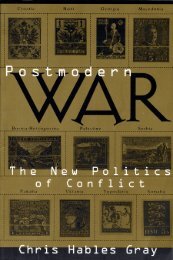Postmodern Wars Imaginary and Real: World War III - Chris Hables ...
Postmodern Wars Imaginary and Real: World War III - Chris Hables ...
Postmodern Wars Imaginary and Real: World War III - Chris Hables ...
You also want an ePaper? Increase the reach of your titles
YUMPU automatically turns print PDFs into web optimized ePapers that Google loves.
[ 160 ] The Past<br />
<strong>and</strong> the United States not only lost the battle for the hearts <strong>and</strong> minds of the<br />
Vietnamese but the struggle for the hearts <strong>and</strong> minds of many Americans as<br />
well. In retrospect, it is clear that the Army's conversion to counterinsurgency<br />
doctrine was only superficial (Krepinevich, 1986). The Vietnam <strong>War</strong><br />
was fought <strong>and</strong> lost as a conventional high-tech war. Vietnam was run along<br />
the assumptions of what has been called crisis management, which is systems<br />
analysis (SA) applied to a crisis. Somebody thinks through various possibilities,<br />
including the effects of effects (feedback); someone gives key factors<br />
certain numerical weights; someone assigns mathematical values (plus, minus,<br />
multiply, divide, or something more complex) to the relations between<br />
various factors; someone makes assumptions about the value of possible<br />
outcomes, <strong>and</strong> then a machine calculates the costs <strong>and</strong> benefits of different<br />
approaches.<br />
Vietnam was the SA war, the electronic war, the computer war, the<br />
technological war. From the point of view of the technophile analysts there<br />
was no reason they could have lost—unless it was because the peace movement<br />
stabbed the military in the back. Others, including many who were there, saw<br />
it differently. The Vietnam <strong>War</strong> is a particularly good case of how subjugated<br />
knowledges can be used to reveal, even change, a society's conception of a<br />
complicated issue. Appeals to the wisdom of the grunts (foot soldiers) are made<br />
by many writers with quite different explanations as to why the war was lost,<br />
but the majority see it as a war that could not have been won.<br />
Obviously, considering their victory, the North Vietnamese knew what<br />
the U.S. strategy was. Gen. Vo Nguyen Giap, their comm<strong>and</strong>er in chief,<br />
described it thus:<br />
The United States has a strategy based on arithmetic. They question the<br />
computers, add <strong>and</strong> subtract, extract square roots, <strong>and</strong> then go into action.<br />
But arithmetical strategy doesn't work here. If it did, they'd already have<br />
exterminated us with their planes. (1970, p. 329)<br />
That even the Vietnamese military leadership could get its views published<br />
in New York in 1970 at the height of the war shows how normally discredited<br />
views can come out.<br />
One book that has applied many of these marginalized views is James<br />
Gibson's The Perfect <strong>War</strong>: Technowar in Vietnam (1986). It is a detailed<br />
examination of the Vietnam <strong>War</strong> as seen by the subjugated knowledges of<br />
combat soldiers from the lower ranks, protesters to the war, dissident officials<br />
within government, <strong>and</strong> journalists. It details how official power, patriotic<br />
ideology, flashy-destructive technology, <strong>and</strong> scientific rules of discourse were<br />
used to formulate <strong>and</strong> perpetuate U.S. policy.<br />
Gibson's conclusion is that the system of discourse for Vietnam is the








